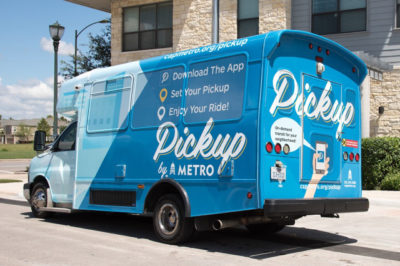
At the Apr. 26 Capital Metropolitan Transportation Authority (Capital Metro) Board of Directors meeting based in Austin, Texas, Capital Metro adopted microtransit service standards based on research led by TTI Associate Research Scientist Todd Hansen. A relatively new term in the transit industry, microtransit services focus on meeting on-demand trip requests through dynamic routing technology, matching trips to vehicles in real time (in a similar fashion to transportation network companies) while sharing rides among passengers. Hansen and his colleagues in the Transit Mobility Program collaborated on the project with Capital Metro’s Demand Response and Innovative Mobility Division during 2019–2020.
Capital Metro operates fixed-route buses, paratransit services and a commuter rail system called Capital MetroRail throughout Austin and surrounding communities. In 2017, Capital Metro launched an app-based Pickup rideshare service as a pilot in the Mueller area to test passenger access to on-demand transit. Subsequently, Pickup service expanded into several new service zones in 2019, and Capital Metro anticipates opening more zones by summer 2021.

At the meeting, Capital Metro representatives noted TTI’s assistance in developing service standards for the microtransit service, which were adapted from the project and presented to the board. The service standards encompass the following categories: community characteristics, service quality, and sustainability.
These service standards help Capital Metro planners make short- and long-term decisions about Pickup service by framing planning priorities with questions like the following:
- Does everyone have access to this service?
- How can the service be more equitable?
- Is the service efficient and reliable for passengers?
- Who currently uses the service?
- Does the service fit Capital Metro’s budget and goals?
“Our team was excited to hear that Capital Metro adopted service standards for the Pickup microtransit service, and we’re glad that our work with the agency could support their development,” Hansen says. “Capital Metro is one of the first transit agencies to develop standards specific to microtransit services and will undoubtedly continue to be a leader in this area with these standards as a resource.”
Hansen presented the poster, Performance Measurement and Evaluation Framework of Public Microtransit Service, during Poster Session 1401 — Beyond Fixed Route Service: On Demand and Other First- and Last-Mile Considerations at the 2021 Transportation Research Board (TRB) Annual Meeting. TRB will publish the full research paper (with the same title as the poster) in a forthcoming Transportation Research Record.
“TTI worked closely with Capital Metro on developing guidelines for our Pickup microtransit program. Pickup is a relatively new kind of public transportation service that required us to develop an innovative program framework from the ground up,” says Chad Ballentine, vice president of Capital Metro’s Demand Response and Innovative Mobility Division. “The Capital Metro Pickup program guidelines are trailblazing. We’re proud to share them with the rest of the transit industry, and we invite our peers to build upon this body of knowledge for years to come.”